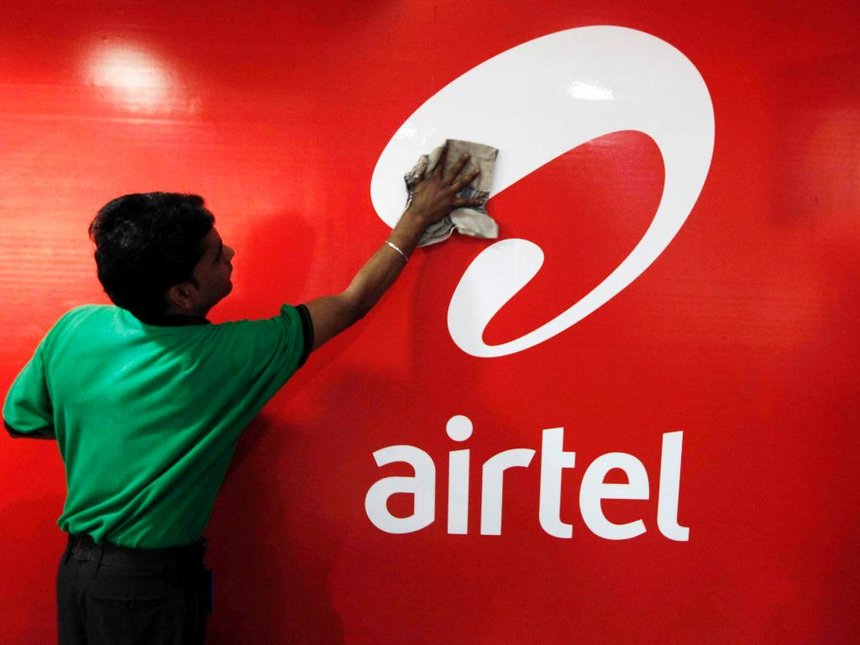Technology
FX-Linked Costs to Pressure Earnings of MTN, Airtel, Others

By Modupe Gbadeyanka
The present foreign exchange (forex) crisis in Nigeria will pose a huge threat to the 2020 earnings of players in the nation’s telecommunications sector, the Head of Equity Research at FBNQuest, Mr Tunde Abidoye, has projected.
In a research note made available to Business Post, he said though now more than ever, the industry was set to take a leading role in the government’s effort to diversify the economy, the FX issue could truncate this.
It was stated that through consistent significant investments by the mobile networks, the sector’s contribution to GDP has risen steadily from about 7.7 per cent in 2012 to 10.9 per cent in Q1 2020, now larger than that of the oil sector (9.5 per cent Q1 2020 oil GDP).
With respect to broadband, studies conducted by the International Telecommunications Union (ITU) indicate that a 10 per cent increase in broadband penetration is likely to translate to increases of 2.0 per cent and 1.8 per cent in GDP for low-income and middle-income countries.
The targets (of 90 per cent broadband coverage at speeds of 10Mbps-25Mbps) stated in the national broadband plan 2020 is ambitious and audacious.
“Notwithstanding, we believe they are achievable. The plan’s success will depend on the right mix of policy implementation, private sector-led infrastructure investment, and government incentives. Specifically, impediments to right-of-way access and cost must be removed,” the note said.
In contrast to other sectors that were hit hard by the economic outcomes of the COVID-19 pandemic, the sector was one of the few that recorded growth in Q1.
Its essential role in easing the lockdown through the provision of digital tools for home working and social distancing resulted in a surge in demand for telecom services during the quarter.
In Q1, MTN Nigeria (MTNN) and Airtel Nigeria (not covered) both delivered strong revenue growth of 17 per cent y/y and 27 per cent y/y respectively, mainly driven by stellar growth in data revenue – which were up by more than 50 per cent for both firms.
The solid performance was carried on into Q2 on the back of strong data demand during the lockdown, with solid revenue growth of 17 per cent y/y (data 40 per cent y/y), Airtel’s Q1 2021 (end-June 2020) results which were recently published, providing positive read-across for the broad sector.
“Due to FX liquidity pressures, we expect a rise in FX-linked costs to exert downward pressure on the earnings of telecom operators,” it noted.
Recently, MTNN disclosed that the NAFEX rate of N385/$1 will now be applied to dollar-linked tower costs (vs. CBN’s official rate of N360 previously). The rate was only recently reviewed to N360/$1 in April (from N307 previously).
“However, we believe that the revenue growth from the surge in data traffic will more than offset the rise in costs.
“Regardless, our estimates are conservative. For MTNN, we forecast 2020 revenue and PBT growth of 13 per cent y/y and 6 per cent y/y respectively,” FBNQuest said.
The Nigerian Communications Commission (NCC) takes the quality of service (QoS) very seriously. As such, on a monthly basis, it measures the operators on four key QoS performance indicators namely; (1) the call setup success rate (CSSR), (2) dropped call rate (DCR), (3) the standalone dedicated control channel congestion (SDCCH), (4) the traffic control channel congestion rate (TCCH). The most recent disclosure (October 2019) from the NCC shows that MTNN and Airtel were within the required threshold for all the KPIs, it added.
It was stated that an independent survey on the service quality of GSM operators conducted by REACH Technologies, an indigenous fintech firm, corroborates the results of NCC’s monthly QoS assessment.
The random survey draws a conclusion from a sample size of 133 respondents residing in Nigeria’s urban region. Out of a maximum score of five points, MTNN scored the highest number of points – 2.3 points – on a weighted average basis. Airtel was the next best in terms of QoS with a score of 1.
About 60 per cent of the 133 respondents that were randomly polled subscribe to the MTNN network. This result is important because it underscores MTNN’s larger wallet share of urban subscribers.
Technology
Capillary Technologies Acquires SessionM from Mastercard

By Modupe Gbadeyanka
A software product company established in 2012, Capillary Technologies India Limited, has acquired the customer engagement and loyalty company, SessionM, from Mastercard.
This followed a definitive agreement signed by the global leader in AI-powered customer loyalty and engagement solutions with the renowned digital payments firm.
The acquisition of SessionM is the latest in a series of strategic moves by Capillary, following its successful listing on the Indian Stock Exchange in November 2025.
With SessionM in its portfolio, Capillary reinforces its position as a global leader in enterprise loyalty, offering a leading platform to the world’s most sophisticated enterprise brands.
Mastercard has identified Capillary Technologies—consistently recognised as a Leader in The Forrester Wave as the ideal partner to lead SessionM into its next era of growth.
As part of the agreement, a specialised team within SessionM will transition to Capillary, ensuring that the platform’s deep technical expertise is preserved.
SessionM’s esteemed global customer base—which includes Fortune 500 retailers, airlines, and CPG brands—will continue to receive the same high-calibre support and service they experienced before the acquisition.
“M&A has been a key growth strategy for Capillary over the years, and as a public company, we are delivering on that promise to our shareholders and the market.
“By bringing SessionM into our portfolio, we are not just expanding our footprint across the globe; we are further strengthening our loyalty capabilities to deliver one of the industry’s most comprehensive offerings.
“Our mission remains to provide enterprises across industries with specialised, AI-native loyalty technology solutions,” the chief executive of Capillary Technologies, Aneesh Reddy, commented.
Technology
Emergent Ventures, Others Invest $2.2m in Potpie

By Dipo Olowookere
About $2.2 million pre-seed round to help engineering teams unify context across their entire stack and make AI agents genuinely useful in complex software environments has been announced by Potpie.
Potpie was established by Aditi Kothari and Dhiren Mathur, who were determined to unify context across the entire engineering stack and enabling spec driven development.
As generative AI adoption accelerates, most tools focus on surface-level code generation while ignoring the deeper problem of context.
Large language models are powerful, but without access to system-level understanding, tooling history, and architectural intent, they struggle in real production environments.
Traditional approaches rely on senior engineers to manually hold this context together, a model that breaks down at scale and fails when AI agents are introduced.
The platform enables teams to automate high-impact and non-trivial use cases across the software development lifecycle, like debugging cross-service failures, maintaining and writing end-to-end tests, blast radius detection and system design.
It is designed for enterprise companies with large and complex codebases, starting at around one million lines of code and scaling to hundreds of millions.
Rather than acting as another coding assistant, Potpie builds a graphical representation of software systems, infers behaviour and patterns across modules, and creates structured artefacts that allow agents to operate consistently and safely.
A statement made available to Business Post on Monday revealed that the funding support came from Emergent Ventures, All In Capital, DeVC and Point One Capital.
The capital will be used to support early enterprise deployments, expand the engineering team, and continue building Potpie’s core context and agent infrastructure, it was disclosed.
“As AI makes code generation easier, the real challenge shifts to reasoning across massive, interconnected systems. Potpie is our answer to that shift, an ontology-first layer that helps enterprises truly understand and manage their software,” Kothari was quoted as saying in the disclosure.
A Managing Partner at Emergent Ventures, Anupam Rastogi, said, “In large enterprises, the real challenge is not generating code, it is understanding the system deeply enough to change it safely.
“Potpie’s ontology-first architecture, combined with rigorous context curation and spec-driven development, creates a structured model of the entire engineering ecosystem. This allows AI agents to reason across services, dependencies, tickets, and production signals with the clarity of a senior engineer. That is what makes Potpie uniquely capable of solving complex RCA, impact analysis, and high-risk feature work even in codebases exceeding 50 million lines.”
Technology
Expert Reveals Top Cyber Threats Organisations Will Encounter in 2026

By Adedapo Adesanya
Organisations in 2026 face a cybersecurity landscape markedly different from previous years, driven by rapid artificial intelligence adoption, entrenched remote work models, and increasingly interconnected digital systems, with experts warning that these shifts have expanded attack surfaces faster than many security teams can effectively monitor.
According to the World Economic Forum’s Global Cybersecurity Outlook 2026, AI-related vulnerabilities now rank among the most urgent concerns, with 87 per cent of cybersecurity professionals worldwide highlighting them as a top risk.
In a note shared with Business Post, Mr Danny Mitchell, Cybersecurity Writer at Heimdal, said artificial intelligence presents a “category shift” in cyber risk.
“Attackers are manipulating the logic systems that increasingly run critical business processes,” he explained, noting that AI models controlling loan decisions or infrastructure have become high-value targets. Machine learning systems can be poisoned with corrupted training data or manipulated through adversarial inputs, often without immediate detection.
Mr Mitchell also warned that AI-powered phishing and fraud are growing more sophisticated. Deepfake technology and advanced language models now produce convincing emails, voice calls and videos that evade traditional detection.
“The sophistication of modern phishing means organisations can no longer rely solely on employee awareness training,” he said, urging multi-channel verification for sensitive transactions.
Supply chain vulnerabilities remain another major threat. Modern software ecosystems rely on numerous vendors and open-source components, each representing a potential entry point.
“Most organisations lack complete visibility into their software supply chain,” Mr Mitchell said, adding that attackers frequently exploit trusted vendors or update mechanisms to bypass perimeter defences.
Meanwhile, unpatched software vulnerabilities continue to expose organisations to risk, as attackers use automated tools to scan for weaknesses within hours of public disclosure. Legacy systems and critical infrastructure are especially difficult to secure.
Ransomware operations have also evolved, with criminals spending weeks inside networks before launching attacks.
“Modern ransomware operations function like businesses,” Mitchell observed, employing double extortion tactics to maximise pressure on victims.
Mr Mitchell concluded that the common thread across 2026 threats is complexity, noting that organisations need to abandon the idea that they can defend against everything equally, as this approach spreads resources too thin and leaves critical assets exposed.
“You cannot protect what you don’t know exists,” he said, urging organisations to prioritise visibility, map dependencies, and focus resources on the most critical assets.
-

 Feature/OPED6 years ago
Feature/OPED6 years agoDavos was Different this year
-
Travel/Tourism10 years ago
Lagos Seals Western Lodge Hotel In Ikorodu
-

 Showbiz3 years ago
Showbiz3 years agoEstranged Lover Releases Videos of Empress Njamah Bathing
-

 Banking8 years ago
Banking8 years agoSort Codes of GTBank Branches in Nigeria
-

 Economy3 years ago
Economy3 years agoSubsidy Removal: CNG at N130 Per Litre Cheaper Than Petrol—IPMAN
-

 Banking3 years ago
Banking3 years agoSort Codes of UBA Branches in Nigeria
-

 Banking3 years ago
Banking3 years agoFirst Bank Announces Planned Downtime
-

 Sports3 years ago
Sports3 years agoHighest Paid Nigerian Footballer – How Much Do Nigerian Footballers Earn













